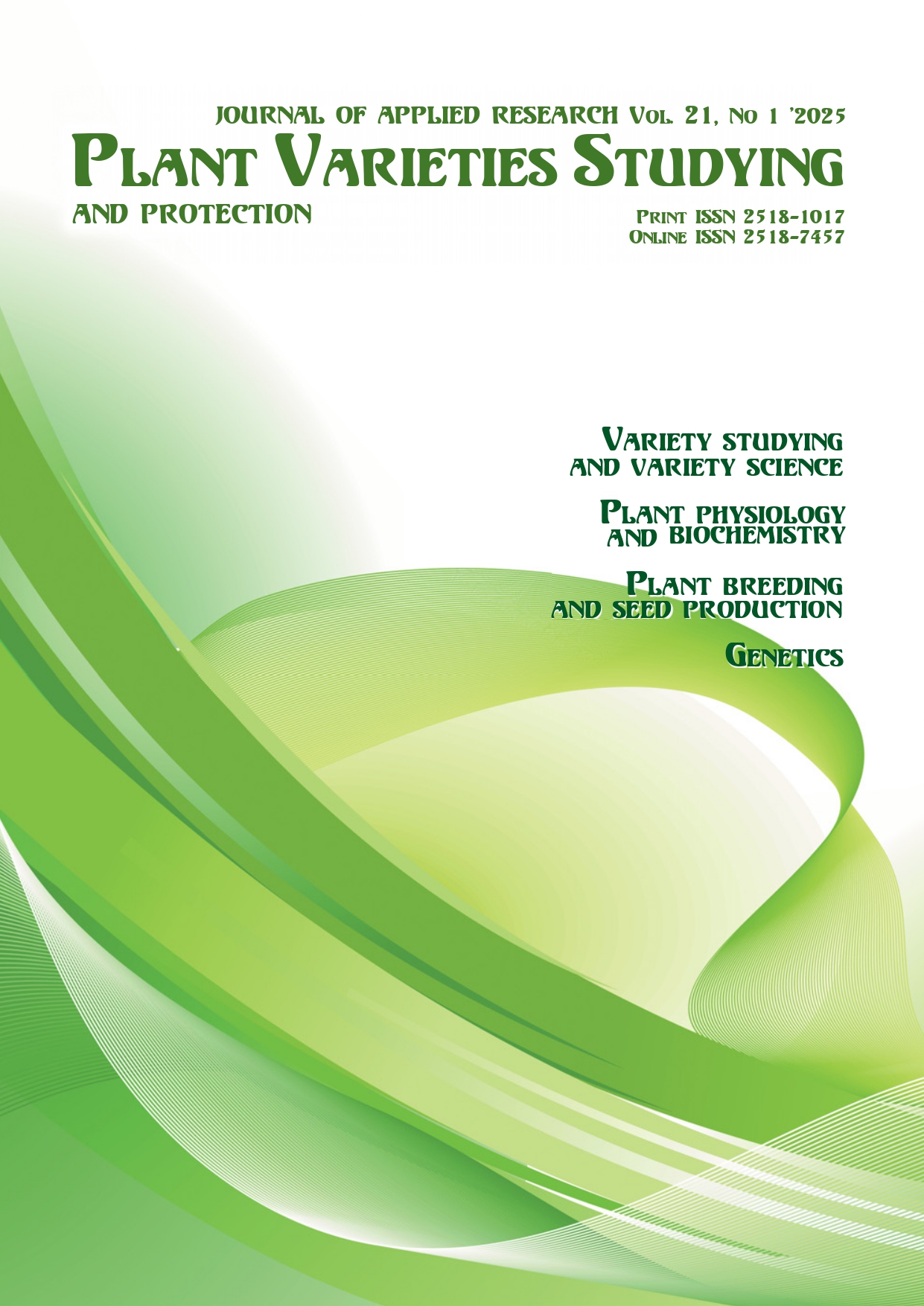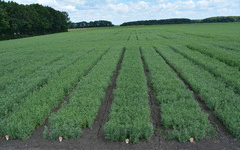Characteristics of the source material for breeding winter wheat for group resistance to leaf and stem pathogens
DOI:
https://doi.org/10.21498/2518-1017.21.1.2025.327497Keywords:
winter wheat, group resistance, resistance genes, leaf and stem diseases, productivityAbstract
Purpose. Investigation of the efficiency of using introgressive lines with group resistance to leaf pathogens as source material in breeding winter wheat (Triticum aestivum L.) for the aforementioned trait. Methods. Field and laboratory (evaluation of resistance to certain races of leaf rust and powdery mildew at the juvenile growth stage in greenhouses and on light plants); PCR analysis (identification of resistance genes to these diseases in the studied material); statistical analysis; and crossbreeding analysis (study of patterns of inheritance and interaction of resistance genes). Results. The original breeding lines of different generations (F4–F5), which were created based on the genetics of wild wheat relatives: Aegilops cylindrica, Ae. variabilis, Triticum ventricosum, Tr. erebuni, Tr. Tauschi, Thinopyrum elongatum, Triticosecale in the PBGI – NCSCI, were studied for group resistance to local populations of leaf diseases and a set of basic agronomic traits. Six lines with effective group resistance genes (Lr24, Lr68, Sr15, Sr31, Sr58, Pm38), as well as their combinations, were identified. These lines provide the selected genotypes with a consistently high level of resistance, excellent grain quality and productivity, regardless of the severity of the infection load. Investigating the genetic basis of the group resistance trait on F1–F2 hybrid material, obtained by crossing the studied lines with susceptible local varieties, revealed that its inheritance is determined by the action of two dominant complementary genes. This indicates the possibility of effectively using this material as donors of high resistance. Conclusions. As a result of the research, we obtained source material in the form of six lines of winter bread wheat that effectively combine a high level of group resistance to leaf pathogens and a set of basic agronomic traits in their genotype. This makes them valuable breeding material. These lines are included as parental components in the crossbreeding plans of the PBGI – NCSCI and are transferred to leading NAAS of Ukraine scientific breeding centres for use in breeding programmes.
Downloads
References
Morgun, V. V., & Topchii, T. V. (2018). The importance of resistant varieties of winter wheat, the study of sources and donors of resistance to pests and main pathogen. Plant Physiology and Genetics, 50(3), 218–240. https://doi.org/10.15407/frg2018.03.218 [In Ukrainian]
Ronald, P. (2011). Plant genetics, sustainable agriculture and global food security. Genetics, 188(1), 11–20. https://doi.org/10.1534/genetics.111.128553
 |
| 
Chai, Y., Senay, S., Horvath, D., & Pardey, P. (2022). Multi-peril pathogen risks to global wheat production: A probabilistic loss and investment assessment. Frontiers in Plant Science, 13, Article 1034600. https://doi.org/10.3389/fpls.2022.1034600
 |
| 
Cottier, T. (1998). The protection of genetic resources and traditional knowledge: Towards more specific rights and obligations in world trade law. Journal of International Economic Law, 1(4), 555–584. https://doi.org/10.1093/jiel/1.4.555
Nelson, R., Wiesner-Hanks, T., Wisser, R., & Balint-Kurti, P. (2017). Navigating complexity to breed disease-resistant crops. Nature Reviews Genetics, 19(1), 21–33. https://doi.org/10.1038/nrg.2017.82
 |
| 
Spring, O., Gomez-Zeledon, J., Hadziabdic, D., Trigiano, R. N., Thines, M., & Lebeda, A. (2018). Biological characteristics and assessment of virulence diversity in pathosystems of economically important biotrophic oomycetes. Critical Reviews in Plant Sciences, 37(6), 439–495. https://doi.org/10.1080/07352689.2018.1530848

Chaukura, N., Gwenzi, W., Bunhu, T., Ruziwa, D. T., & Pumure, I. (2016). Potential uses and value-added products derived from waste polystyrene in developing countries: A review. Resources, Conservation and Recycling, 107, 157–165. https://doi.org/10.1016/j.resconrec.2015.10.031

Figueroa, M., Hammond‐Kosack, K. E., & Solomon, P. S. (2018). A review of wheat diseases – A field perspective. Molecular Plant Pathology, 19(6), 1523–1536. https://doi.org/10.1111/mpp.12618
 |
| 
Kaur, S., Samota, M. K., Choudhary, M., Choudhary, M., Pandey, A. K., Sharma, A., & Thakur, J. (2022). How do plants defend themselves against pathogens-biochemical mechanisms and genetic interventions. Physiology and Molecular Biology of Plants, 28(2), 485–504. https://doi.org/10.1007/s12298-022-01146-y
 |
| 
Finkch, M. R. (2008). Integration of breeding and technology into diversification strategies for disease control in modern agriculture. In D. B. Collinge, L. Munk, & B. M. Cooke (Eds.), Sustainable Disease Management in a European Context (pp. 399–409). Springer. https://doi.org/10.1007/978-1-4020-8780-6_19

Hovmøller, M. S., Patpour, M., Rodriguez-Algaba, J., Thach, T., Justesen, A. F., & Hansen, J. G. (2021). GRRC report of yellow and stem rust genotyping and race analyses 2020. Aarhus University. https://agro.au.dk/fileadmin/www.grcc.au.dk/International_Services/Pathotype_YR_results/GRRC_annual_report_2020.pdf
Gjedrem, T., Robinson, N., & Rye, M. (2012). The importance of selective breeding in aquaculture to meet future demands for animal protein: A review. Aquaculture, 350–353, 117–129. https://doi.org/10.1016/j.aquaculture.2012.04.008

Mourad, A. M. I., Sallam, A., Belamkar, V., Wegulo, S., Bowden, R., Jin, Y., Mahdy, E., Bakheit, B., El-Wafaa, A. A., Poland, J., & Baenziger, P. S. (2018). Genome-wide association study for identification and validation of novel SNP markers for Sr6 stem rust resistance gene in bread wheat. Frontiers in Plant Science, 9, Article 380. https://doi.org/10.3389/fpls.2018.00380
 |
| 
Wu, X., Bian, Q., Gao, Y., Ni, X., Sun, Y., Xuan, Y., Cao, Y., & Li, T. (2021). Evaluation of resistance to powdery mildew and identification of resistance genes in wheat cultivars. PeerJ, 9, Article e10425. https://doi.org/10.7717/peerj.10425
 |
| 
Babayants, O. V., & Babayants, L. T. (2014). Fundamentals of breeding and methodology of wheat resistance to pathogens. VMV. [In Ukrainian]
Vezzulli, S., Gramaje, D., Tello, J., Gambino, G., Bettinelli, P., Pirrello, C., Schwandner, A., Barba, P., Angelini, E., Anfora, G., Mazzoni, V., Pozzebon, A., Palomares-Rius, J. E., Martínez-Diz, M. P., Toffolatti, S. L., De Lorenzis, G., De Paoli, E., Perrone, I., D’Incà, E., … Reisch, B. I. (2022). Genomic designing for biotic stress-resistant grapevine. In C. Kole (Ed.), Genomic Designing for Biotic Stress Resistant Pulse Crops (pp. 87–255). Springer International Publishing. https://doi.org/10.1007/978-3-030-91802-6_4

Lagudah, E. S., McFadden, H., Singh, R. P., Huerta-Espino, J., Bariana, H. S., & Spielmeyer, W. (2006). Molecular genetic characterization of the Lr34/Yr18 slow rusting resistance gene region in wheat. Theoretical and Applied Genetics, 114(1), 21–30. https://doi.org/10.1007/s00122-006-0406-z
 |
| 
Litun, P. P., Kyrychenko, V. V., Petrenkova, V. P., & Kolomatska, V. P. (2009). Systems analysis in field crop breeding. Mahda LTD. [In Ukrainian]
Lisovyi, M. P. (2001). Genetics of Plant Resistance to Pathogens: Historical Development and Research Prospects. In V. V. Morhun (Ed.), Genetics and Breeding in Ukraine at the Turn of the Millennium (Vol. 2, pp. 263–279). Lohos. [In Ukrainian]
Rybalka, O. I., Chervonis, M. V., Parfentiev, M. H., & Akselrud, D. V. (2006). Method for indirect assessment of our “strength” – SDS-30 sedimentation (Patent of Ukraine No. 17023). https://uapatents.com/3-17023-sposib-nepryamo-ocinki-sili-boroshna-sedimentaciya-sds30.html [In Ukrainian]
Derzhspozhyvstandart of Ukraine. (2003). Seeds of agricultural plants. Methods for seed testing: State Standard of Ukraine (DSTU) 4138:2002. [In Ukrainian]
Derzhspozhyvstandart of Ukraine. (2019). Wheat. Specifications: State Standard of Ukraine (DSTU) 3768:2019. [In Ukrainian]
Published
How to Cite
Issue
Section
License
Copyright (c) 2025 Ye. A. Holub, N. I. Sauliak, O. A. Vasyliev, M. A. Lytvynenko, V. A. Traskovetska, Z. V. Shcherbyna, M. A. Bushulian, Ye. I. Kirchuk

This work is licensed under a Creative Commons Attribution-ShareAlike 4.0 International License.
Starting in 2022, the copyright to the publication remains with the authors
Our journal abides by the CREATIVE COMMONS copyright rights and permissions for open access journals.
Authors, who are published in this journal, agree to the following conditions:
- The authors reserve the right to authorship of the work and pass the first publication right of this work to the journal under the terms of a Creative Commons Attribution License, which allows others to freely distribute the published research with the obligatory reference to the authors of the original work and the first publication of the work in this journal.
- The authors have the right to conclude separate supplement agreements that relate to non-exclusive work distribution in the form in which it has been published by the journal (for example, to upload the work to the online storage of the journal or publish it as part of a monograph), provided that the reference to the first publication of the work in this journal is included.

























 Ukrainian Institute for Plant Varieties Examination
Ukrainian Institute for Plant Varieties Examination  Селекційно-генетичний інститут
Селекційно-генетичний інститут Institute of Plant Physiology and Genetics of the National Academy of Sciences of Ukraine
Institute of Plant Physiology and Genetics of the National Academy of Sciences of Ukraine
 The National Academy of Agrarian Sciences of Ukraine
The National Academy of Agrarian Sciences of Ukraine